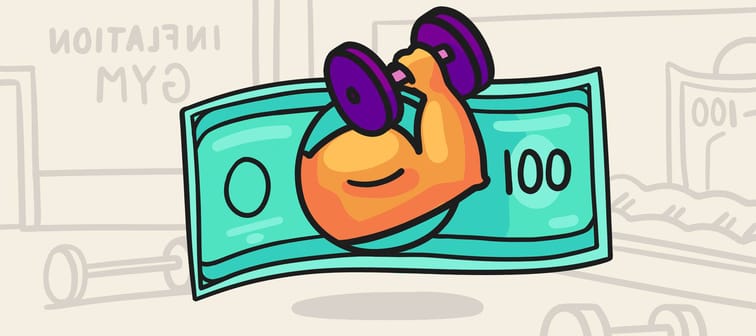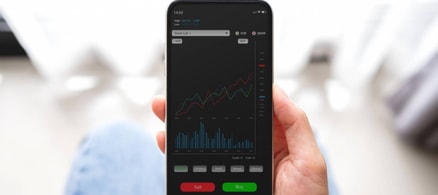“If you have a diversified portfolio, you’ve already planned for inflation,” says Ramit Sethi, a personal finance expert who wrote I Will Teach You To Be Rich and runs a business with the same name.
What does that mean — and how can you determine whether you have a strong mix of investments in place?
How inflation could affect your investment portfolio
Even though the market may experience volatility on any given day, stocks — as a whole — tend to trend upward over the very long term. This means that you can mitigate the negative impacts of inflation through a diversified portfolio invested in balanced index or mutual funds.
“A simple target-date fund or index fund tends to handily outpace inflation over the long term,” Sethi explains.
Index funds allow you to passively replicate the return of a benchmark index — the S&P 500 or Nasdaq 100, for example. Target-date funds are mutual funds designed to adjust your level of risk exposure as you get closer to your target retirement date.
If you plan to retire in 30 years, for example, your target-date fund will gradually and automatically transition more of your investments from stocks, which offer high growth/risk potential, to bonds, which provide smaller but more stable returns.
“If your focus is on the long term, then unforeseen and unpredictable events like the rise of inflation should not alter your long-term strategy,” says Felicia Gopaul, a certified financial planner and financial coach.
By maintaining a balanced investment portfolio even during periods of inflation, you won’t miss out on any potential market growth.
More: How to measure inflation
Stabilize your portfolio by investing in farmland
Farmland is one of the top asset classes capable of insulating your money from volatile market conditions. Learn how you can use FarmTogether to safeguard your portfolio.
Diversify nowThink twice before changing your investment strategy
We’ve all heard the advice to buy low, sell high, but with inflation high you might be wondering whether to put more money into the market, move your money out of stocks, look for alternative investments or temporarily pause any new investments.
To start, the answer depends on how the rest of your budget is doing. With prices up across most sectors, you may find yourself needing to cut back on one or more expenses — and if you’ve already pulled back on nonessentials and wrung any savings you can out of your regular expenses, you may choose to trim your monthly or quarterly investment goals.
But think carefully before changing your investing strategy if you’ve already set up a diverse portfolio. If you put money into a 401(k) and receive a company match, for example, reducing your contributions might lower the amount of matched funds you receive from your employer — which would be like leaving money on the table.
Likewise, many retirement savings accounts come with tax advantages that could save you money in the short term. Cutting back on your traditional IRA or health savings account contributions, for example, could increase the taxes you owe while decreasing your opportunity for long-term investment growth.
That said, if the rising costs are making it harder to cover day-to-day expenses, consider allocating more of your money toward cash savings. “You may want to increase your emergency fund to ensure the rising costs of your daily expenses are set aside,” Gopaul says.
Alternative investments to hedge against inflation
Today’s conditions might inspire you to investigate options that aren’t tied closely to what happens on Wall Street or that tend to make money in the face of inflation.
You might want to consider sectors that make things that people need even when prices go up, such as food and fuel.
For example, investments in real estate and land typically perform well during periods of high inflation, when property prices and rents go up. And investment advisors traditionally point to commodities, including agricultural goods, metals and oil, as a hedge against inflation, but know that they’re relatively risky due to ever-changing supply and demand factors.
Then there are investments designed to match their returns to the current rate of inflation, such as Treasury Inflation-Protected Securities, also known as TIPS. These kinds of investments are best for people who already have a balanced portfolio and are planning on holding the securities for at least a year.
“TIPS can make sense for those people who have some cash sitting on the sidelines,” Gopaul says. “It gives them a better yield than savings, money market or even short-term CD rates. If they can wait at least one year [before selling the investment], for certain investors it can make sense.”
The best advice on inflation may be to ride it out with your diverse investment strategy, avoid overspending and keep focusing on your long-term financial goals.
Sponsored
Diversify your investments with farmland
You don’t have to own a farm to profit off farmland.
Farmland has proven to be one of the most stable assets of the past few decades — and with FarmTogether, you’re able to invest today. FarmTogether's platform gives accredited investors access to this exciting market, and one of the highest-yielding asset classes on a risk-return basis.
Sign up for FarmTogether to start investing in farmland.







